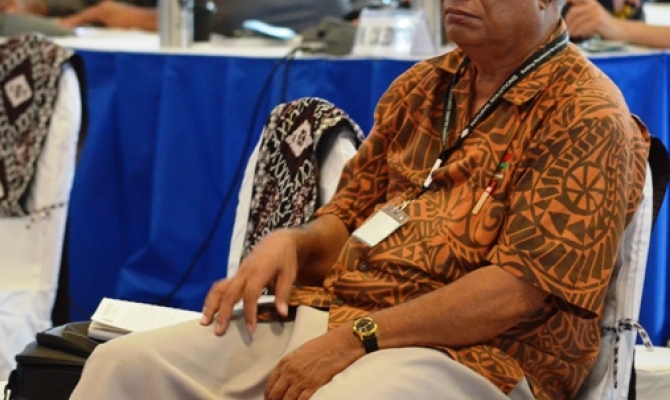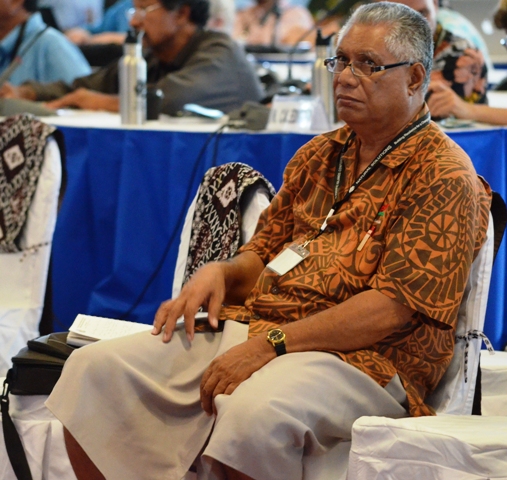
Island and Ocean Ecosystems
6 December 2013, Suva Fiji - By Priya Chand, journalism student at USP:- Church leaders must be encouraged to integrate nature conservation into their spiritual work and evangelism, said environment consultant Tusani Joe Reti.
 Tusani Joe Reti - Environment Consultant
Tusani Joe Reti - Environment Consultant
Speaking at the 9th Pacific Island Conference on Nature Conservation and Protected Areas in Suva Tusani Joe said The Bible dictated that it was the responsibility of human beings and custodians of God's creations to respect and look after the creation for his own good and prosperity.
This belief provided a wide open door for conservation education and awareness to be fully embedded in the teaching of the religious faith, he said.
He said Christian leaders in his home country of Samoa had begun to do this with relative success.
"In a small number of villages in Samoa, church ministers have or are leading village efforts in the management of their natural resources," said Tusani Joe.
"Backed by the village councils, these efforts are often regarded as successful, firstly in terms of the number of village people participating and secondly in the least amount of resistance observed compared to other developmental projects and programs on village lands."
However, he said when asked to say an opening prayer for an environment-related activity, church ministers had not been successfully engaged to lead or support village based conservation projects and initiatives in Samoa.
"I believe the same is true of other Pacific island countries as well and it is tragic because we have this pool of skilled people whom we have not been able to fully utilise," he said.
He added that at times the failure was because of the mistaken belief that conservation work was below such respected members of society.
Tusani Joe emphasised that the conservation movement needed all the help it could get, and that every effort should be made to partner with community leaders like church ministers and village heads.
Several nature conservation leaders agreed with Tusani Joe.
Among them was Ms. Elise Huffer, the Secretariat of the Pacific Community's adviser on culture and human development.
Ms. Huffer said there was a disconnect between cultural views and how conservation workers worked.
"In the Pacific culture, many people put more emphasis and importance on what their church has to say," she said. "Church plays a huge role so we need leaders to say that nature and biodiversity needs to be looked after."
She added that the need to engage with faith-based groups in working to achieve conservation goals should included as one of the guiding principles for conservation in the action strategy being drawn up.
Priya Chand is a member of the Media Team providing coverage of the 9th Pacific Islands Conference on Nature Conservation and Protected Areas from 2 to 6 December in Suva, Fiji. This is a partnership between the Fiji National University (FNU), University of the South Pacific (USP), SPREP and Pacific Islands News Association (PINA) whereby a team of 10 journalism students are mentored by senior reporters as they cover the conference. This activity is funded by the Pacific Assistance Media Scheme (PACMAS).
 Tusani Joe Reti - Environment Consultant
Tusani Joe Reti - Environment ConsultantSpeaking at the 9th Pacific Island Conference on Nature Conservation and Protected Areas in Suva Tusani Joe said The Bible dictated that it was the responsibility of human beings and custodians of God's creations to respect and look after the creation for his own good and prosperity.
This belief provided a wide open door for conservation education and awareness to be fully embedded in the teaching of the religious faith, he said.
He said Christian leaders in his home country of Samoa had begun to do this with relative success.
"In a small number of villages in Samoa, church ministers have or are leading village efforts in the management of their natural resources," said Tusani Joe.
"Backed by the village councils, these efforts are often regarded as successful, firstly in terms of the number of village people participating and secondly in the least amount of resistance observed compared to other developmental projects and programs on village lands."
However, he said when asked to say an opening prayer for an environment-related activity, church ministers had not been successfully engaged to lead or support village based conservation projects and initiatives in Samoa.
"I believe the same is true of other Pacific island countries as well and it is tragic because we have this pool of skilled people whom we have not been able to fully utilise," he said.
He added that at times the failure was because of the mistaken belief that conservation work was below such respected members of society.
Tusani Joe emphasised that the conservation movement needed all the help it could get, and that every effort should be made to partner with community leaders like church ministers and village heads.
Several nature conservation leaders agreed with Tusani Joe.
Among them was Ms. Elise Huffer, the Secretariat of the Pacific Community's adviser on culture and human development.
Ms. Huffer said there was a disconnect between cultural views and how conservation workers worked.
"In the Pacific culture, many people put more emphasis and importance on what their church has to say," she said. "Church plays a huge role so we need leaders to say that nature and biodiversity needs to be looked after."
She added that the need to engage with faith-based groups in working to achieve conservation goals should included as one of the guiding principles for conservation in the action strategy being drawn up.
Priya Chand is a member of the Media Team providing coverage of the 9th Pacific Islands Conference on Nature Conservation and Protected Areas from 2 to 6 December in Suva, Fiji. This is a partnership between the Fiji National University (FNU), University of the South Pacific (USP), SPREP and Pacific Islands News Association (PINA) whereby a team of 10 journalism students are mentored by senior reporters as they cover the conference. This activity is funded by the Pacific Assistance Media Scheme (PACMAS).